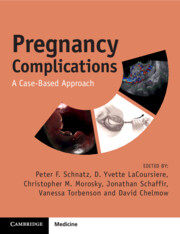Book contents
- Pregnancy Complications
- Pregnancy Complications
- Copyright page
- Contents
- Contributors
- Preface
- Note from the Editor-in-Chief
- Normal Laboratory Values (Conventional Units) []
- Section 1 Antepartum (Early Pregnancy)
- Section 2 Antepartum (Mid-trimester)
- Section 3 Antepartum (Late Pregnancy)
- Section 4 Antepartum (Medical Complications)
- Case 32 A 35-Year-Old Presents at 25 Weeks’ Gestation with Abnormal Glucose Tolerance Testing
- Case 33 A 25-Year-Old Presents at 35 Weeks’ Gestation with Hypertension, Proteinuria, and Seizure
- Case 34 A 25-Year-Old at 32 Weeks’ Gestation with Hypertension and Right Upper Quadrant Pain
- Case 35 A 35-Year-Old Presents at 8 Weeks’ Gestation with Tremor and Exophthalmos
- Case 36 A 23-Year-Old Primigravida at 8 Weeks’ Gestation with Fatigue, Constipation, and Cold Intolerance
- Case 37 A 25-Year-Old with Elevated Hemoglobin A2 on Initial Prenatal Labs
- Case 38 A 30-Year-Old at 10 Weeks’ Gestation with a New Positive HIV Test
- Section 5 Antepartum (Infectious Complications)
- Section 6 Intrapartum/Delivery
- Section 7 Postpartum
- Section 8 Fetal Complications
- Section 9 Placental Complications
- Section 10 Complications of the Cord, Amnion, and Gravid Uterus
- Section 11 Psychosocial Considerations
- Index
- References
Case 33 - A 25-Year-Old Presents at 35 Weeks’ Gestation with Hypertension, Proteinuria, and Seizure
from Section 4 - Antepartum (Medical Complications)
Published online by Cambridge University Press: 08 April 2025
- Pregnancy Complications
- Pregnancy Complications
- Copyright page
- Contents
- Contributors
- Preface
- Note from the Editor-in-Chief
- Normal Laboratory Values (Conventional Units) []
- Section 1 Antepartum (Early Pregnancy)
- Section 2 Antepartum (Mid-trimester)
- Section 3 Antepartum (Late Pregnancy)
- Section 4 Antepartum (Medical Complications)
- Case 32 A 35-Year-Old Presents at 25 Weeks’ Gestation with Abnormal Glucose Tolerance Testing
- Case 33 A 25-Year-Old Presents at 35 Weeks’ Gestation with Hypertension, Proteinuria, and Seizure
- Case 34 A 25-Year-Old at 32 Weeks’ Gestation with Hypertension and Right Upper Quadrant Pain
- Case 35 A 35-Year-Old Presents at 8 Weeks’ Gestation with Tremor and Exophthalmos
- Case 36 A 23-Year-Old Primigravida at 8 Weeks’ Gestation with Fatigue, Constipation, and Cold Intolerance
- Case 37 A 25-Year-Old with Elevated Hemoglobin A2 on Initial Prenatal Labs
- Case 38 A 30-Year-Old at 10 Weeks’ Gestation with a New Positive HIV Test
- Section 5 Antepartum (Infectious Complications)
- Section 6 Intrapartum/Delivery
- Section 7 Postpartum
- Section 8 Fetal Complications
- Section 9 Placental Complications
- Section 10 Complications of the Cord, Amnion, and Gravid Uterus
- Section 11 Psychosocial Considerations
- Index
- References
Summary
Hypertension disorders of pregnancy are a clinical spectrum that includes gestational hypertension, preeclampsia, and eclampsia. Hypertensive disorders are a common cause of significant maternal and fetal morbidity and mortality. Therefore, it is important for women’s health clinicians to be knowledgeable of the diagnostic criteria and management guidelines. A 25-year-old gravida 3 para 0 at 35 weeks’ gestation presents with a blood pressure of 165/95, proteinuria, and develops seizures. Based on her clinical presentation, physical examination, and laboratory findings, a diagnosis of eclampsia was made. The patient was promptly stabilized, treated with magnesium sulfate for seizure prophylaxis, received antihypertensive treatment, and delivered in a timely manner. The case highlights the recommended maternal evaluation, fetal surveillance, timing of delivery, and treatment for hypertension disorders of pregnancy.
- Type
- Chapter
- Information
- Pregnancy ComplicationsA Case-Based Approach, pp. 100 - 102Publisher: Cambridge University PressPrint publication year: 2025

